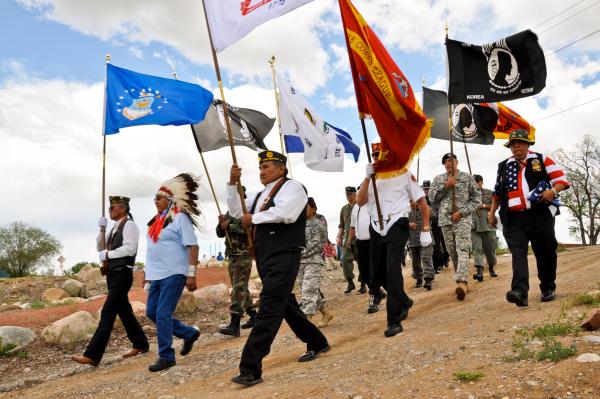Recognition for Service by Native Americans May Finally Be Coming

Native Americans, including American Indians, Alaska Natives and Native Hawaiians, serve at a higher rate in the U.S. Armed Forces that any other group and have served in all of the nation’s wars since the Revolutionary War honorably and courageously. Twenty-eight Natives have won the Medal of Honor, the nation’s highest military decoration. The Navajo, Comanche, Choctaw, Tlingit and other Native nations created codes that enemies couldn’t break, turning the tide in both world wars.
And yet, among all the memorials and monuments on the National Mall in Washington, D.C., there is not one that recognizes the contributions of Native warriors. But that, hopefully, will soon change.
On May 23, Senator Brian Schatz (D-Hawaii) introduced a bill, S. 1046, Native American Veterans’ Memorial Amendments Act of 2013, that would facilitate the construction of a Native American Veterans Memorial on the National Mall in Washington, D.C. Senators Mazie Hirono (D-Hawaii), John Barrasso (R-Wyoming), and Jon Tester (D-Montana) are original co-sponsors.
“Every Memorial Day we honor the men and women who have served our country in the armed forces, and [this] legislation would allow for construction of a memorial on the National Mall so that people from across the country can honor the extraordinary contributions and sacrifices of our Native American veterans,” said Schatz, after introducing the bill.
“Our Native veterans have sacrificed their lives for this country and it is important that we recognize their bravery and patriotism with a fitting memorial. I look forward to working with my colleagues on the Indian Affairs Committee and in the United States Senate to get this bill passed and finally have a National Native American Veterans Memorial in our nation’s capital.”
Schatz’s bill would clarify the Native American Veterans’ Memorial Establishment Act of 1994, proposed by then-Senators Daniel Inouye (D-Hawaii) and Daniel Akaka (D-Hawaii) and Senator John McCain (R-Arizona), amending the bill to allow for the completion of the long-standing project. The 1994 act okayed the construction of the memorial, but didn’t provide for the funding of it.
According to the National Congress of American Indians, the project has encountered a number of obstacles since the legislation’s passage, including limitations placed on the involvement of the National Museum of the American Indian (NMAI). The new language removes a number of technical barriers that have hindered completion and allows for the memorial to be built adjacent to NMAI, not inside the museum as originally proposed. Additionally, NMAI would be able to participate in raising funds for the effort.
“It is essential that we fulfill Senator Inouye and Indian Country’s vision for a memorial to honor the service and sacrifice of our Native American service members. NCAI supports the amendments to the Native American Veterans’ Memorial Establishment Act of 1994, which will make the memorial a reality and allow for it to be built on the property of the National Museum of the American Indian,” said Jefferson Keel, President of NCAI and a decorated veteran, in a press release. “Most importantly, this bill allows for more flexibility for tribal nations and the United States to work together to honor the contributions and sacrifices of American Indian, Alaska Native, and Native Hawaiian military service members and veterans. As a Native veteran myself, I look forward to the day my fellow veterans are recognized for their contributions to protecting the sovereignty of tribal nations and the United States.”
Increased efforts for a memorial honoring the military service of Natives on the National Mall can be traced back to the 1980s when the well-known The Three Soldiers sculpture was unveiled near the Vietnam Veterans Memorial. Depicted are three American soldiers: one white, one black and a Hispanic. The exclusion of a Native American was seen as disrespectful by Indian country.
Robert Holden, director of the National Congress of American Indians, said that the sculpture excludes Native Americans, and does not fully depict their contributions. During the Vietnam era, for example, more than 42,000 Native Americans served in the military and 90 percent of those service members were volunteers. Holden also said during a press conference call that the national organization was told that the Hispanic figure in the sculpture was meant to represent not only Hispanics but also Native Americans: "that is not satisyfing."
“Given that Native American people are not currently acknowledged anywhere in the National Mall," said Holden, "I think Native Americans are seeking that recognition—that Native people are true patriots and have been really since the American Revolution.”
In the press conference call, NMAI Director Kevin Gover said he didn’t know how much the memorial will cost. But he said the entire project will be funded by private sources. “We are grateful to Senator Schatz for his interest, and Senators Inouye and Akaka for their contribution. And we look forward to working with Senator Schatz as we move forward, empowering the National Museum of the American Indian to be directly involved in the process of erecting this memorial,” said Gover.
Gover also said he didn’t know where the memorial will be placed. The museum will solicit proposals from artists. There are several possible locations, he said, “But artists being who they are may see other places.”
Regardless of where it stands, the memorial would be meaningful for Native peoples, said Native Hawaiian veteran Allen Hoe during the conference call.
"Native Americans, Alaskans, and Hawaiians have a traditional belief in honoring our warriors," he said.
“Native Americans have fought bravely and been a critical part of the American military for generations,” Senator Tester said recently. “It’s long-past time we honor their sacrifices with the recognition they earned. This memorial is one more way we can pay our respects and say ‘thank you’ for their courageous service to our country.”
To track the progress of Schatz’s bill in Congress, click here.
Read more at http://indiancountrytodaymedianetwork.com/2013/05/27/recognition-service-native-americans-may-finally-be-coming-149551
